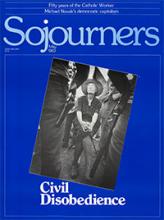A friend, actually the first of many, once asked me a question: "Why do we choose civil disobedience over the more acceptable forms of protest?" The question seemed incorrect. I don't think it is accurate to say that we choose civil disobedience. Even the term disobedience—while we continue to use it—less and less describes what we are about.
Civil disobedience implies a basic faith in a system that needs changes in certain areas. So one disobeys unjust laws to press for those changes, on the level of consciousness and then in the law.
I think it dangerous and misleading to use the term, to talk about constitutional rights, the first amendment, etc. Our Constitution and Bill of Rights never speak about the real powers which control human life. They speak of government and of the citizen or citizens as if they constituted the whole calculus; whereas we know from experience and observation that the forces and powers that control and govern the whole economy and major policy lie in the Pentagon, CIA, National Security Agency, and the gigantic transnational corporations. These have, for longer than we've known, shaped the world into rich and poor, privileged and oppressed.
When people have spoken derisively of "the establishment," or "the system," they were struggling to find some way to indicate those powers more basic than the bureaucracy and leadership that determine human conduct and what passes for national life. They are struggling to pinpoint the same thing as Paul was when he said: "Our struggle is not against flesh and blood but the principalities and powers of this world" (Ephesians 6:12).
Read the Full Article

